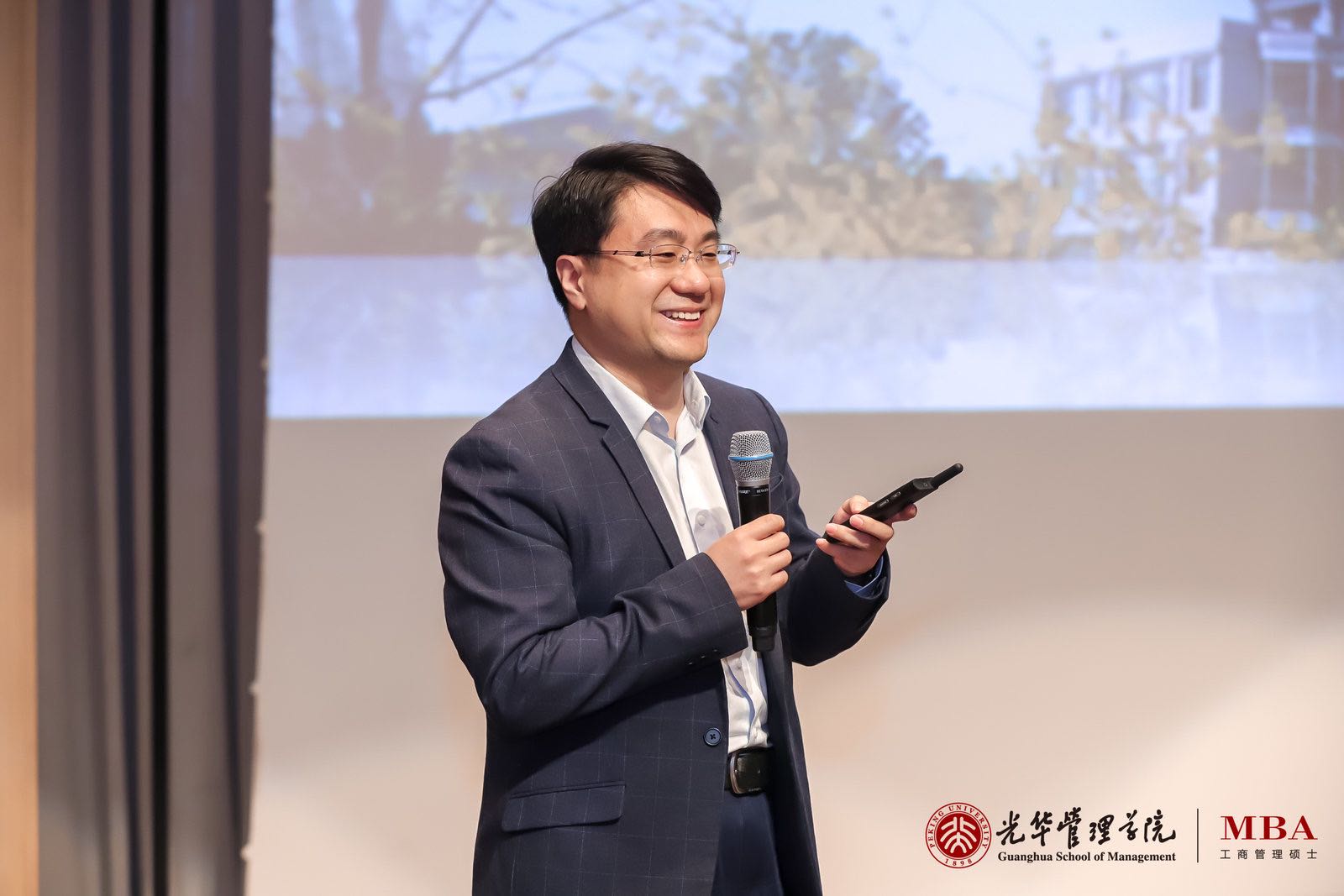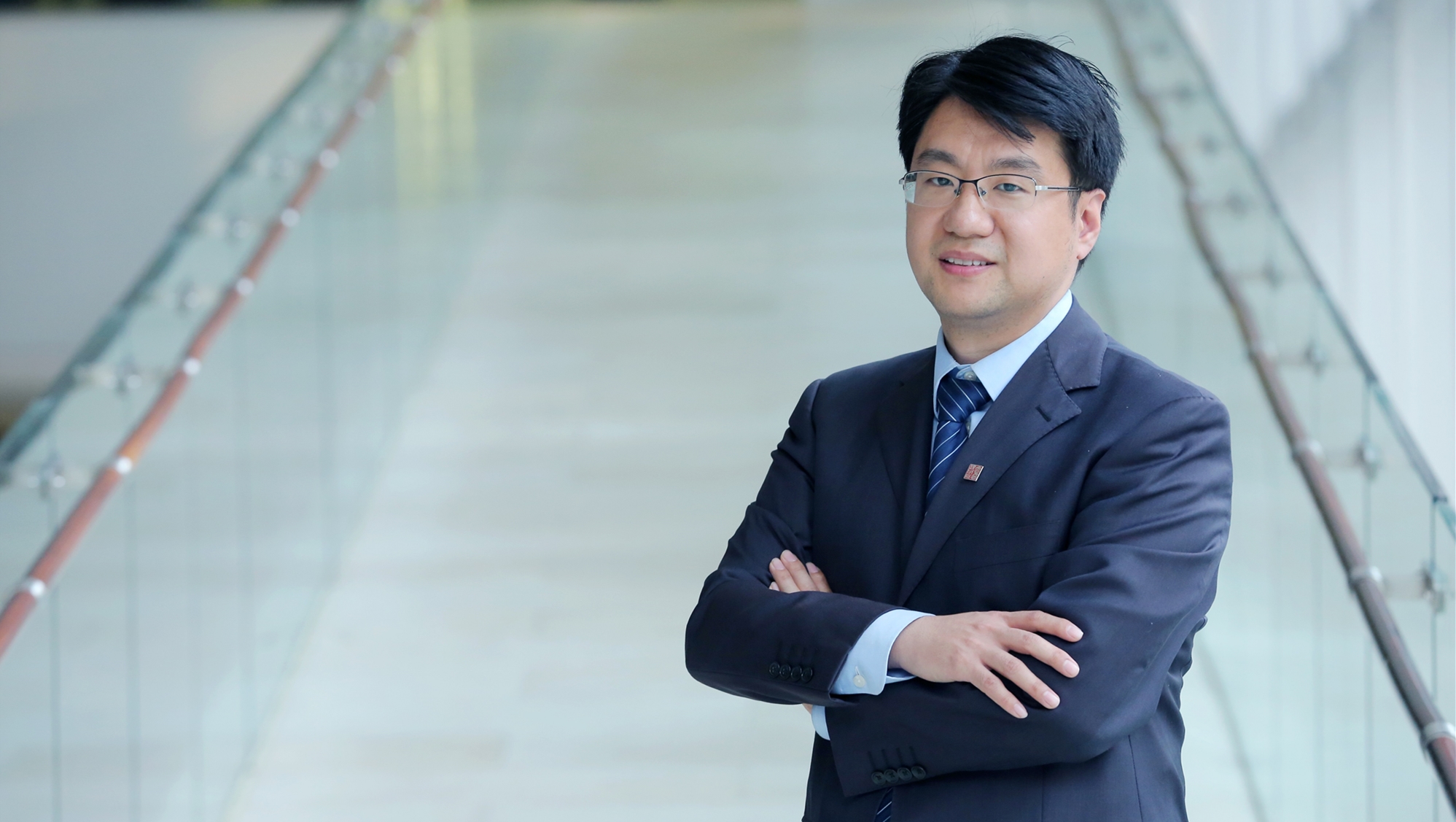Peking University, May 5, 2021: As the mid-autumn breeze filled the air outside the fifth floor lobby of Guanghua School of Management, Associate Professor Wang Hui adjusted his position on a chair and began recounting his life at PKU. “Too often we ponder our future. My purpose at PKU is to guide students to explore all potential fields that would interest them, and encourage them to create their own paths of excellence with the skills they have learned from my class.” Wang, the recipient of the 2020 Outstanding Teaching Award of Peking University, commented with a beaming smile. Wang’s passion and dedication to education was well reflected from his lectures, his interactions with students, and most importantly the way he carried himself as a respectable professor at the Guanghua School of Management.
Embarking on a career in education
Wang Hui, currently the associate professor of Applied Economics at Guanghua School of Management, was previously a PKU student himself. After completing his doctorate degree in economics from the University of Toronto, Wang came back to PKU as an educator, embarking on a career in education and research that spanned on for more than 10 years. Throughout the years of his academic pursuit, Wang was no stranger to the lonesome and tedious nights in the office, all of which cultivated his success as a distinguished professor at the most prestigious business school in China

Wang was among the first ones to adapt the “small class teaching module” and integrate it into the economics curriculum in 2013, which has since been implemented for 7 years and still ongoing. Currently, it has become a highlight and major feature of this course. Every year, more than 300 students, which consisted of undergraduate students at Guanghua, as well as students from many other departments attend the economics classes taught by Wang. If you ever ran into a student attending Professor Wang’s “Management Economics”, you would most likely find yourself hearing these responses regarding the professor: “lively”, “practical”, “responsible”. To put it simply, Professor Wang collected the most useful and applicable content in the subject and reassembled them into a coherent course, emphasizing the crucial parts in each chapter, thereby enabling students to grasp the material fully and utilize them in real-life applications. From reading a heavy stack of course evaluations completed by countless anonymous students who attended Wang’s class, it became apparent that all students liked Wang. He was a superb teacher and an amicable counselor. Students were encouraged by the energy Wang exhibited at his lectures, as it often boosted students’ morale, and propelled many to realize that true happiness could only be achieved when you find your true passion in life.

“Please tell them, tell them I love what I do, and I’m really good at it...” With a seemingly simple quote from the movie “The Martian,” it encompassed a few principles Wang held dear to his heart. As a professor, he often had students approaching him with troubles deciding on what to do with their future. Wang noticed that regardless of students’ major or academic merits, university has turned into a stage where many students begin to question their true passion in life. “Economics is about capturing people’s incentive...” Maybe it’s due to his profession as an economics professor, Wang strongly believed that when educating students, especially students at Guanghua, the primary focus should be on arousing his students’ interests and letting them know that the economic mindset they learn would become an indispensable component of their impending future. “There’s a reason why courses such as microeconomics and macroeconomics are mandatory for all students...” Courses were set up in a way to help students understand how the world around them functioned, and that how to interpret current global events with a new perspective. Economics itself could be seen as a form of “decision theory”, which would teach people how to use available resources and information to make optimal decisions. Everyone has to make enormous decisions everyday, and Wang hoped that through his lectures, students would learn to apply critical thinking and economic principles to their daily lives, and observe the world through the eyes of an economist. “That, to me, would be my greatest accomplishment as an economics professor,” Wang noted.

During his ten years of teaching and research, Professor Wang admitted that he has also encountered many difficult and sometimes even frustrated moments: papers that needed repeated revisions, countless regression tests, and trivial data checking works, all of which were unavoidable elements in academic researches. People who found it tedious might gradually lose interest overtime, but there were also others, like Wang, who dedicated much of his life to academia without a single tinge of doubt. Most people tend to view Wang as a very smart and innately talented educator, but they might overlook the amount of work it took Wang to get to his position today. “I’m just a lucky guy who benefited so much from his alma mater and chose to return back...” With a humble smile on his face, Wang gave off a radiance that was amplified once he started speaking. As the recipient of the 2020 Outstanding Teaching Award of Peking University, Wang has influenced numerous students through the means of education. Seated with his students in the brilliance of sunlight, it seemed clear as day as to why Wang was such an accomplished professor beloved by so many.
The purpose of being an economics professor
What is the purpose of studying economics? Or in Professor Wang’s case, what constitutes as the ultimate goal educators should strive to achieve through the teaching of economics? During the interview, Wang pointed out that, the field of economics, in contrary to popular belief, encompasses a lot more than learning about the way money functions in our society. All of us are active participants contributing to the economy both domestically and globally, yet the majority of people still do not know what economics as a subject truly entails, which indirectly amplifies the indispensable importance of teaching economics in higher education. Alfred Marshall, the great 19th century economist, once said, “Economics is a study of mankind in the ordinary business of life.” The reality is that economics is a study on society, social behavior, government policies, and many more aspects closely tied to our daily lives. Wang hoped that his lessons on economics would help students understand the world in which they live, as well as developing the ability of making knowledgeable decisions related to economics. On a bigger scale, Wang wanted his students to regard economics on a macro scale, and attain the ability to ask the important questions regarding the potential and limits of economic policy established in China and around the world.

When he was asked regarding the advantages of being a teacher, Professor Wang responded: teaching benefits both sides of the classroom, teacher and students alike.” Wang always encouraged his students to actively participate in discussions and ask challenging questions in class. In this way, students can develop their critical thinking skills and achieve a deeper understanding in economics. Additionally, the frequent interactions between the teacher and the students could propel further explorations in the subject and occasionally might lead to important new research topics. Ultimately, from both sides of the table, teacher and the students alike, could all benefit from the class as they learn from one another.

As a PKU alumni and a well-acclaimed professor at the Guanghua School of Management, Wang has witnessed the endless potential in a great number of intelligent and bright individuals. From the lessons he’s taught, to the conversations he had with his students, Wang has established himself as more than a professor, but also a mentor and a friend, who could offer valuable life advice and a helpful hand in need.
Written by: Rose Li
Edited by: Zhang Jiang
Photo credit to: Wang Hui





